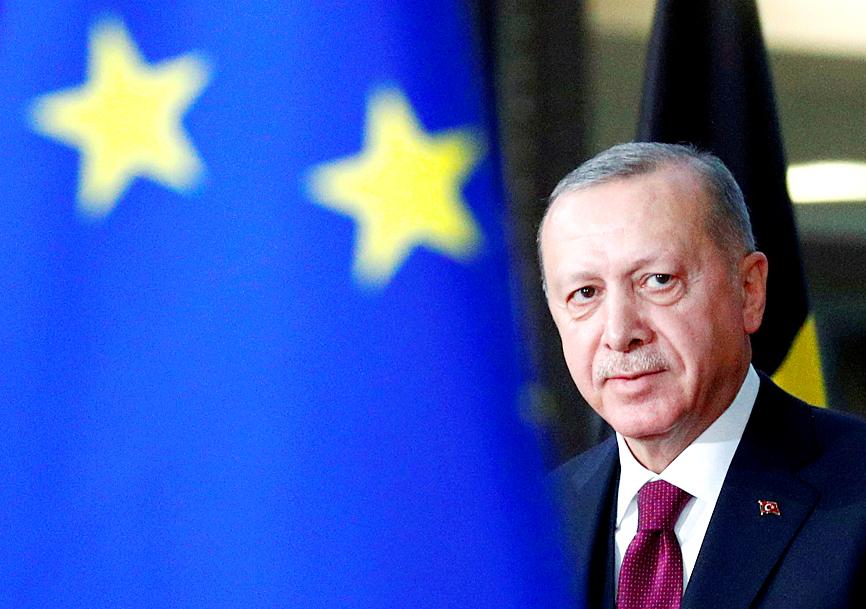A year of crisis for the lira has kept people in Turkey buying gold at a record pace. Now the appetite for more bullion risks becoming a drag on the currency just as a rally struggles to regain momentum.
In the two weeks after Turkish President Recep Tayyip Erdogan cleared out the leadership ranks blamed for failing to stabilize the lira and draining reserves, Turkish retail investors and firms added US$2.2 billion to their gold holdings, taking them to US$36.4 billion, or almost triple the total last year, Turkish central bank data showed.
People are not relenting in their zeal to own gold, despite a historic turnaround in the lira and this month’s decline in bullion prices, but with gold imports now accounting for most of the current-account deficit, the purchases are getting in the way of mending Turkey’s external imbalances even as authorities increasingly adopt the market-friendly approach that foreign investors crave.

Photo: Reuters
“We see steady demand from local investors for gold even at higher than world prices — unattractive deposit rates and the lack of trust in the lira are the main reasons driving the demand,” said Dogukan Cicek, business development executive at Troy Precious Metals in Istanbul. “A retreat in global gold prices is also seen as an opportunity for those who think gold’s story is far from being over.”
Turkey is one of the biggest consumers of the precious metal worldwide. Turks use gold as protection during times of currency devaluation and inflation, and traditionally gift it for events from weddings to circumcision ceremonies.
Domestic buyers are piling into gold in tandem with greater purchases of foreign exchange (FX). Deposits in hard currencies rose US$34.5 billion to a record US$228.2 billion this year. Locals also added US$3.94 billion to their foreign-exchange savings in the two weeks through Friday last week.
When it comes to gold, local habits are proving hard to break even after the lira soared more than 10 percent in the week following the ouster of the central bank governor and the resignation of Erdogan’s son-in-law as Turkish minister of finance.
However, the currency has grown less steady in the past few days, even after the central bank raised interest rates by the most in more than two years and took other measures to cool a lending boom.
Turkey’s currency has lost 25 percent this year, making it the second-worst performer in emerging markets after the Argentine peso.
While gold slipped this month after dropping for three straight months, it is still up about 19 percent this year after reaching a record in August.
Combined with declines in the lira, the precious metal provided better returns for local investors than bonds or Turkey’s benchmark index of stocks.
Regular Turks are not alone in finding solace in bullion. The central bank is also continuing to accumulate gold reserves, bringing its holdings to an all-time high last month.
Turkey’s gold imports are on track for the most since 2017, according to Borsa Istanbul data.
Given that foreign investors remain wary of Turkish assets, the challenge for Erdogan and his new economy team is to wean people off gold in the hope of inspiring enough confidence in the lira.
“Demanding gold means demanding FX to buy it,” said Evren Kirikoglu, an independent market strategist in Istanbul. “It’s one of the obstacles ahead for the lira’s appreciation.”

Among the rows of vibrators, rubber torsos and leather harnesses at a Chinese sex toys exhibition in Shanghai this weekend, the beginnings of an artificial intelligence (AI)-driven shift in the industry quietly pulsed. China manufactures about 70 percent of the world’s sex toys, most of it the “hardware” on display at the fair — whether that be technicolor tentacled dildos or hyper-realistic personalized silicone dolls. Yet smart toys have been rising in popularity for some time. Many major European and US brands already offer tech-enhanced products that can enable long-distance love, monitor well-being and even bring people one step closer to

Malaysia’s leader yesterday announced plans to build a massive semiconductor design park, aiming to boost the Southeast Asian nation’s role in the global chip industry. A prominent player in the semiconductor industry for decades, Malaysia accounts for an estimated 13 percent of global back-end manufacturing, according to German tech giant Bosch. Now it wants to go beyond production and emerge as a chip design powerhouse too, Malaysian Prime Minister Anwar Ibrahim said. “I am pleased to announce the largest IC (integrated circuit) Design Park in Southeast Asia, that will house world-class anchor tenants and collaborate with global companies such as Arm [Holdings PLC],”

Sales in the retail, and food and beverage sectors last month continued to rise, increasing 0.7 percent and 13.6 percent respectively from a year earlier, setting record highs for the month of March, the Ministry of Economic Affairs said yesterday. Sales in the wholesale sector also grew last month by 4.6 annually, mainly due to the business opportunities for emerging applications related to artificial intelligence (AI) and high-performance computing technologies, the ministry said in a report. The ministry forecast that retail, and food and beverage sales this month would retain their growth momentum as the former would benefit from Tomb Sweeping Day

Thousands of parents in Singapore are furious after a Cordlife Group Ltd (康盛人生集團), a major operator of cord blood banks in Asia, irreparably damaged their children’s samples through improper handling, with some now pursuing legal action. The ongoing case, one of the worst to hit the largely untested industry, has renewed concerns over companies marketing themselves to anxious parents with mostly unproven assurances. This has implications across the region, given Cordlife’s operations in Hong Kong, Macau, Indonesia, the Philippines and India. The parents paid for years to have their infants’ cord blood stored, with the understanding that the stem cells they contained